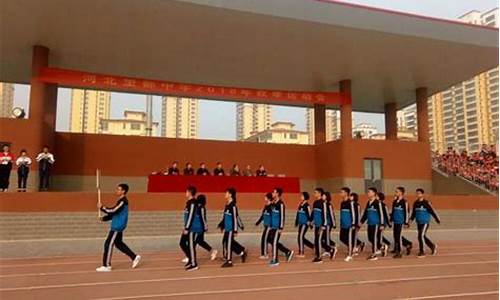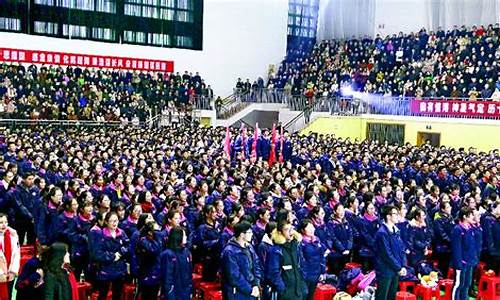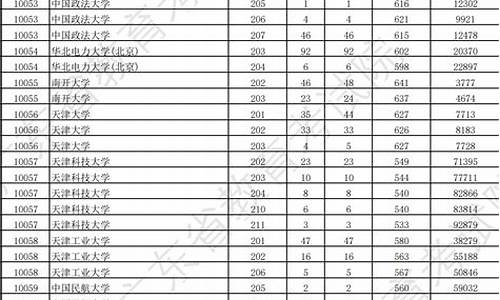时态衔接高考_高考时态题做题方法
1.高考英语语法填空进行时态知识点与必记的单词
2.英语学习资料:2015年高考英语同步训练之动词的时态和语态
3.如何破解高考英语试卷中的时态难题 高考复习英语下册

#高考# 导语时态(Tense)是表示行为、动作和状态在各种时间条件下的动词形式。因此,当我们说时态结构的时候,指的是相应时态下的动词形式。以下是 考 网为大家整理的《十六种时态变化用法》供您查阅。
英语时态分为16种:一般现在、一般过去、一般将来、过去将来时,以及这四者的进行时、完成时和完成进行时。
1.一般现在时 (do/does; is/am/are)
① 表示现在的情况、状态或特征。
例:He is a student.
他是一个学生。
② 表示经常性、习惯性动作。
例:He always helps others.
他总是帮助别人。
③ 客观事实和普遍真理。
例:The earth moves the sun.
地球绕着太阳转。
④ 表示一个按规定、计划或安排要发生的动作。
仅限于某些表示“来、去、动 、停、开始、结束、继续”等的动词,可以与表示未来时间的状语搭配使用 。
常见的用法是:飞机、火车、轮船、汽车等定期定点运行的交通方式。
例:The next train leaves at 3 o'clock this afternoon.
下一趟火车今天下午3点开车。
⑤ 在时间、条件和让步状语从句中经常用一般现在(有时也用现在完成时)表示将的来事情。(即:主将从现原则)
例:I will call you as soon as I arrive at the airport.
我一到机场就会给你打电话。
When you have finished the report, I will have waited for about 3 hours.
等你完成这份报告的时候,我就已经等了将近3个小时了。
2. 现在进行时(am/is/are doing)
① 表示此时此刻正在发生的事情。
例:He is listning to the music now.
他现在正在听音乐。
② 表示目前一段时间内一直在做的事情,但不一定此时此刻正在做。
例:I am studying computer this term.
这个学期我一直在学习计算机。
③ 现在进行时可以表示将来的含义。
a. 瞬时动词的进行一定表将来。
例: I am leaving.
我要离开了。
b. 持续动词的进行只有有将来的时间状语或有将来语境中才表将来。
例: I am travelling next month.
下个月我要去旅行。
④ 现在进行时与频度副词连用,表示说话者或褒义或贬义的感情 色彩。
例: He is always helping others.
他总是帮助别人。(褒义)
3. 现在完成时(have/has done)
① 表示动作到现在为止已经完成或刚刚完成,强调对现在产生的影响。
例:I bought a new house, but I haven't sold my old one yet, so at the moment I have two houses.
我买了一所新房子,但是还没有卖掉旧的,所以现在我又两所房子。
② 表示从过去某时刻开始,持续到现在的动作或情况,并且有可能会继续延续下去。此时经常用延续性动词。
时间状语常用since加一个过去的时间点,或for加一段时间,或by加一个现在时间。
例:Great as Newton was, many of his ideas have been challenged today and are being modified by the work of scientists of our time.
虽然牛顿是个伟大的人物,但他的许多见解直到今天还在受到挑战,并且被现代科学家的工作所修正
4. 现在完成进行时(have/has been doing)
表示某一动作开始于过去某一时间,延续或重复地出现至今,或将继续延续至将来。
例:We have been working on this project for over a month now.
到目前为止,我们一直在处理那个项目,已经花了一个多月时间了。
5. 一般过去时 (did; was/were)
① 表示过去某个时间发生的动作或情况。
例:I bought some fruits yesterday.
我昨天买了一些水果。
② 表示过去习惯性动作。
例:When I was a boy,I often swam in that river.
would/used to do:表示过去常常......
例:The old man would sit on a bench in the quiet park and look at others for hours without doing anything or talking to anybody.
老人过去常常坐在宁静的公园里的一条长椅上,看着其他的人,一坐就是数个小时,什么也不干,也不和任何人交谈。
He used to visit his mother once a week.
他以前总是每周看望一次他的母亲。
6. 过去完成时(had done)
表示在过去的某个时间或动作以前已经发生的动作或已经存在的状态。就是我们常说的"过去的过去"。
Until then, his family hadn't heard from him for six months.
到那时为止,他家里已经有六个月没得到他的消息了。
7. 过去将来时(would do)
表示从过去的某个时间看将要发生的事。
例:I said on Thursday I should see my friend the next day.
我星期四说我将于第二天拜访我的朋友。
8. 过去进行时(was/ were doing)
① 表示在过去具体的时间正在发生的动作。
例:Mary was listening to light music 10 minutes ago.
10分钟前,玛丽正在听轻音乐。
② 表示过去某个时间段内一直在发生的事情。
例:I was travelling in London last summer vacation.
去年暑假我在伦敦旅行。
③ 过去进行时可以表示过去将来的含义。
a. 瞬时动词的过去进行时一定表示过去将来的含义。
例:Then she said she was leaving.
然后她说她要离开了。
b. 持续动词的过去进行时只有在有过去将来的时间状语或过去将来的语境下才能表示过去将来。
例:She said that she was travelling the next day.
她说她第二天要去旅行。
④ 过去进行时和频度副词连用可以表示说话者或褒义或贬义的感情 色彩。
9. 一般将来时
(1)will do
① 表示主语主观意愿的将来。
例:I will send her a glass hand-made craft as her birthday gift.
我将送给她一个玻璃的手工制品,作为给她的生日礼物。
② 表示客观将来。
例:Fish will die without water.
离开水,鱼会死。
③ 表示临时决定。
例:——Mary has been ill for a week.
——Oh,I didn't know. I will go and see her.
(2)am/is/are going to do
① 表示计划、打算做某事。
例:This is just what I am going to say.
这正是我想说的。
② 表示根据某种迹象看,很可能或即将发生的事情,表推测。
例:Look at the dark clouds in the sky. It's going to rain.
看天上的乌云,要下雨了。
(3)am/is/are about to do
表示“即将、正要”时,可用。强调近期内或马上要做的事。
例:Don't worry, I am about to make a close examination on you.
别担心,我马上就给你做一次仔细的检查。
(4)be to do
① 表示“按计划、安排即将发生某事或打算做某事”。
例:She is to be seen in the lab on Monday.
星期一你准会在实验室见到她。
② 该做或不该做的事情(语气上接近于should, must, ought to, have to),表示一种命令、规劝性语气。
例:You are to go to bed and keep quiet, kids. Our guests are arriving in less than 5 minutes.
10. 将来进行时(will be doing)
表示在将来的某个具体时间正在发生的动作或事情。
例:Don't worry, you won't miss her. She will be wearing a red T-shirt and a white skirt at that time.
别担心,你不会认不出她的。她到时会穿一件红色的T恤衫和一条白色的短裙。
11. 将来完成时(will have done)
表示从将来的某一时间开始、延续到另一个将来时间的动作或状态,或是在某个将来时间完成,但对其后的另一个将来时间有影响的动作或状态。就好象把现在完成时平移到时间轴的将来时时段一样。
例:The conference will have lasted a full week by the time it ends.
会议从开始到结束将持续整整一个星期。
12. 将来完成进行时:(will have been doing)
表示动作从某一时间开始一直延续到将来某一时间,是否继续下去,应视上下文而定。
例:By the end of next month, the project will have been being worked for 3 years.
到下个月底为止,这项工程就已经不停地进行了3年了。
13. 过去完成进行时:had been doing
表示某一动作一直延续到过去某一时间,是否继续下去,应视上下文而定。
例:The old clock had been being taken apart of and fixed up again for several times by my 10-year old son before I came back home.
我回到家之前,我10岁大的儿子已经把这个旧钟表拆卸并重新组装了好几回了。
14. 过去将来进行时:( would be doing )
表示就过去某一时间而言,将来某一时间或时间段正在进行的动作,主要用于从句中。
例:The promised that a new highway would be being built next July.
政府说第二年7月将有一条新的高速公路正在修建。
15. 过去将来完成时:(would have done)
表示就过去某一时间而言,将来某一时间之前所完成的动作。常用在虚拟语气中,表示与过去事实相反。
例:I believed by the end of that year an advanced version of that software would have been developed, but I was wrong.
我坚信到那年年底为止,那个软件的新版本将被开发出来。但是我错了。
16. 过去将来完成进行时:(would have been doing)
表示就过去某一时间而言,将来某一时刻之前一直在进行的动作,是否继续下去,应视上下文而定。
例:They said that by the end of the following month, the project would have been being worked for 3 years.
他们说到第二个月底为止,这项工程就已经不停地进行了3年了。
高考英语语法填空进行时态知识点与必记的单词
现在完成时对现在有影响,但过去完成时则是过去某时已完成的动作。不同很明显的。
如He has closed the door.暗指门现在已关上。
The train had left when I got to the station. 暗指我去车站时火车已离开。是过去的过去。
英语学习资料:2015年高考英语同步训练之动词的时态和语态
时态(tense)是一种动词形式,不同的时态用以表示不同的时间与方式。它是表示行为、动作、状态在各种时间条件下的动词形式,在英语中有16种时态。我在这里整理了相关资料,希望能帮助到您。
高考英语语法填空进行时态知识点
进行时态
过去将来进行时的墓本概念、形式和用法
过去将来进行时(future-in-the-past continuous tense)表示在对过去某一时间而言的将来某一时刻或某一段时间正在进行的动作。
1)过去将来进行时的形式由should be(第一人称)或wonld be(第二、三人称)加现在分词构成。美国英语一律用wonld。
2)过去将来进行时的用法
a)表示在过去的将来的某一时刻或某段时间正在进行的动作。如:
He asked me what I should be doing at ten the next day.他问我第二天十点钟我将干什么。
They said that they would be expecting us the next week.他们说他们下个星期等我们去。
b)表示在过去某一时间之后即将或按计划进行的动作。如:
He said he could not come because he would be haying a meeting.他说他不能来,因为要开会。
一般时态与进行时态的区别
一般时态与进行时态的主要区别有二:
1)一般时态通常表示经常的动作或状态,而进行时态则表示在某一时刻或某段时间正在进行着的动作。如:
We read newspapers every day.我们每天读报。
She is now reading the newspaper.她现在正在读报。
2)一般时态表示主语的固有特征、能力等,而进行时态则表示主语在某一时刻或某段时间内所进行的具体动作。如:
He sings well.他唱得很好。
He is singing a folk song.他在唱一首民歌。
[注] 并不是所有的动词都能用进行时态,例如表达状态、感情和感觉的某些动词,通常只能用一般时态而不能用进行时态,例如"know"(知道)一般就不能用进行时态。这类动词还有be(是),have(有),1ove (爱),hate(恨),want(想要),1ike(喜欢),think(认为),believe(相信),see(看见),hear(听见)等。
现在进行时的基本概念
1)现在进行时表示此时此刻(说话人说话时)正在进行的动作,它并不表明这一动作从什么时候开始,到什么时候结束。汉语常用"(正)在"或"着"来表示这种时间关系。如:
What are you doing?
-I'm doing some washing.你在干什么?--我在洗衣服。
Look! It is snowing.瞧!下着雪哩。
She is drawing a map.她在画一张地图。
Are they listening to the music?
-NO,they are listening to the radio.他们在听音乐吗?--不,他们在听收音机。
2)现在进行时可表示现阶段正在进行着的动作,虽然此时此刻这个动作可能并不在进行。如:
He is working on a paper.他在写一篇论文。
They are compiling a dictionary.他们在编一本词典。
3)现在进行时有时可表示将来发生的动作,有"意图"或"打算"的含义(用于go,come,stay,1eave,start等表示移动的动词)。如:
He is corning to see you tomorrow.他明天要来看你。
They are going to the Ming tombs this coming Sunday.这个星期天他们要到十三陵去。
They are taking the children to the zoo on Sunday.他们星期天要带孩子们去动物园。
What are you doing next Sunday? I'm going on a picnic with my wife and daughter.这个星期天你要干什么?我要和妻子和女儿去野餐。
过去进行时的基本概念
过去进行时(past continuous tense)表示过去某一时刻或某段时间正在进行的动作。如:
I was practicing the violin at eight o'clock yesterday evening. 昨晚八点钟我正在练习小提琴。
When Walter arrived home,his sister was doing her homework.沃尔特到家时,他妹妹正在做作业。
Pat was watching TV all evening. 帕特整个晚上都在看电视。
过去进行时的形式
过去进行时由was(第一、三人称单数)或were (其余各人称和数)加现在分词所构成。
过去进行时的基本用法
表示在过去某一时刻或某一段时间正在进行的动作,这一特定的时间往往须用时间状语来表示。如:
She was reading an English magazine when I came in.我进来时她在看一本英文杂志。
It was getting dark.天黑了。
They were working all day yesterday.他们昨天整天工作。
We were cleaning the auditorium from 7 to 9 last night.昨晚七点到九点我们在打扫大礼堂。
I met him when he was crossing the street.他过街时我碰见他。
过去进行时的其他用法
1)表示移动的动词go,come,start,stay,leave等的过去进行时,可以表示过去将来发生的动作。如:
They wanted to know when we were leaving for Shanghai. 他们想知道我们什么时候到上海去。
She asked whether he was starting then ext day.她问他是否第二天就动身。
2)动词go的过去进行时态加动词不定式,可以表示在过去某一时间之后将要发生的动作。(比较8.24的3)如:
They said they were going to set up a nursery.他们说他们要设立一个托儿所。
She said the foreign guests were going to visit the Shanghai in dustrial Exhibition.她说外宾要去参观上海工业展览会。
The monitor announced that our new teacher was going to speak to us.班长宣布新老师要跟我们讲话。
3)过去进行时可用来描写故事发生的背景。如:
It was a dark night. The wind was blowing hard and the rain was falling heavily. A young woman suddenly appeared on the riverbank. it was Xier. She had just escaped from Huang Shiren's house.那是一个漆黑的夜晚。风刮得很厉害,雨下得很大。一个年轻妇女突然出现在河岸上。这就是喜儿。她刚从黄世仁的家里逃了出来。
过去一般时与过去进行时用法比较
过去一般时通常表示过去发生的一个单纯的事实,而过去进行时则表示在过去某一时刻或某段时间正在进行的动作,强调在这一过程中所进行的动作或展开的情景。试比较:
We built a bridge last winter.去冬我们修了一座桥。(意即去冬我们做了这件事,桥已经修好了。)
We were building a hydro-electric station last winter.去冬我们在修水电站。(意即去冬我们一直在修水电站,修完与否不详)
I wrote a letter home last night. 昨晚我写了一封家信。(意即)昨晚我做了这件事,信写完了。)
I was writing a letter to my pen friend in America last night. 昨晚我在给我的美国笔友写信。(意即昨晚我一直在写信,不一定写完)
语法填空识记单词
1. appear:v.出现 ? (appearance)n.外貌;出现
2. give - gave - given 给
3. think - thought - thought 认为
thought:n.思想,想法?(thoughtful)adj.深思的;体贴的
4. leave - left - (left)留下
5. close:adj.近的 ? (closely) adv.近
6. tradition:n.传统 ? (traditional) adj.传统的
nutrition:n.营养 ? (nutritional) adj.有营养的
nature:n.自然 ? (natural) adj. 自然的
person:n.个人 ? (personal) adj.个人的?(personally)adv.就个人而言
7. happy:adj.高兴的 ? (happiness) n.幸福 ? (happier) adj.更高兴的 ?(happier为happy的比较级,be happy with ... 对...满意)
8. color:n.颜色,彩色 ? (colorful) adj.彩色的
care:n.护理 ? (careful) adj.小心的 ? (carefully) adv. 小心
use:n.用处 ? (useful)adj.有用的
wonder:v.想知道;n.奇迹 ? (wonderful)adj.精彩的? (wonderfully) adv.极好地
9. luck:n.运气 ?(lucky)adj.幸运的 ? (luckily) adv.幸运的是 ? (unluckily) adv.不幸运的是(but提示)
10. fortune:n.运气 ? (fortunately) adv.幸运的是 ?(misfortune)n.不幸
? (unfortunately) adv.不幸运的是(but提示)
11. eat:v.吃 ? (eating)(为eat的动名词) n.吃? eat - ate - eaten
12. call:v.把...称为 ? (called) (为call的过去分词)
13. grow - grew - grown 生长 ? (growth) n.生长
14. especial:adj.尤其的,特殊的 ? (especially) adv.尤其
15. sell - (sold) 卖; buy - (bought) 买
16. main:adj.主要的 ? (mainly) adv.主要
17. educate:v.教育 ? (education) n.教育
18. feel - (felt) 感到;fall - (fell) 落下
19. practice:v./n.练习 ? (practically) adv. 实际上
20. recover:v.恢复 ? (recovery) n.痊愈
21. survive:v.幸存 ? (survival)n.幸存 ? (survivor)n.幸存者
22. understand - understood - understood 理解 ? (misunderstand) 误解
23.(responsible) adj.有责任感的 ? (responsibility)n.责任感 ? be responsible for 对...负责
24. able:adj.有能力的 ? (ability) n.能力
25. honest:adj.诚实的 ? (honestly) adv.诚实地 ?(honesty)n.诚实
26. fool:v.愚弄;n.傻瓜 ? (foolish) adj.愚蠢的
27. dead:adj.死的 ? (deadly) adj. 致命的
28. tell - told - told 告诉;sell - (sold)
29. avail:v.有益 ? (available) adj.可利用的
reason:n.原因 ? (reasonable) adj. 合情合理的
30. please:v.使...高兴;请 ? (pleased)adj. 高兴的 ? (pleasure) n.愉悦 ?(pleasant)adj.令人愉快的
31. accept:v.接受 ? (acceptance) n.认可,接受
32. win - won 赢;differ:v.不同 - (different) adj.不同的
33. break - broke - broken 打碎
34. wear - (wore) - worn 穿
tear - (tore) - torn:v.撕破;流泪 n.眼泪
35. loss:n.损失 ? lose:v.丢失;迷失 ? lost:adj.迷路的;丢失的
36. wood:n.木材 ? (woody) adj.木质的
37. regular:adj.有规律的,定期的 ? (regularly) adv.定期
38. possible:adj.可能的 ? (possibly) adv.可能地
probable:adj.可能的 ? (probably) adv.可能地
terrible:adj.可怕的 ? (terribly) adv.可怕地
simple:adj.简单的 ? (simply) adv.简直;简单地
39. surprise:n.惊喜;v.使吃惊 ? (surprisingly) adv.惊人地
increase:v.增加 ? (increasingly) adv. 日益增加地
40. actual:adj.实际的 ? (actually) adv.实际上
41. sudden:adj.突然的 ? (suddenly) adv.突然
42. fall- (fell) - fallen 落下
43. build - built - (built) 修建 (rebuild:v.重建)
44. slow:adj.慢的;v.减慢 ? (slowly) adv.慢地
45. blood:n.血液 ? (bleed) v.流血
46. effect:n.效果 ? (affect) v.影响
have an effect on sb 对...有影响
47. perform:v.表演 ? (performer) n.表演者 ? performance n.表演
48. decide:v.决定 ? (decision) n.决定
49. contribute:v.贡献 ? (contribution)n.奉献(to)
50. develop:v.发展 ? (development)n.发展(with)
51. assist:v.帮助 ? (assistant)n.助手
52. arrive:v.到达 ? (arrival)n.到达
如何破解高考英语试卷中的时态难题 高考复习英语下册
2015年高考英语同步训练之动词的时态和语态
Ⅰ.单项填空
2013年高考真题:
1. “What do you want to be?” asked Mrs. Crawford. “Oh, I ______ president,” said the boy, with a *** ile.(湖南)
A. have been B. am
C. was D. will be
2. Around two o'clock every night, Sue will start talking in her dream. It somewhat ______ us.(湖南)
A. bothers B. had bothered
C. would bother D. bothered
3. If nothing ______, the oceans will turn into fish deserts.(湖南)
A. does B. had been done
C. will do D. is done
4. — Have you heard about the recent election?
— Sure, it ______ the only thing on the news for the last three days.(湖南)
A. would be B. is
C. has been D. will be
5. — I don't understand why you didn't go to the lecture yesterday afternoon.
— I'm so sorry. But I ______ my homework. (湖南)
A. had done B. was doing
C. would do D. am doing
6. Shakespeare's play Hamlet ______ into at least ten different films over the past years. (北京)
A. had been made B. was made
C. has been made D. would be made
7. — Do you think Mom and Dad ______ late?
— No, Swiss Air is usually on time.(北京)
A. were B. will be
C. would be D. have been
8. Hurry up! Mark and Carol ______ us.(北京)
A. expect B. are expecting
C. have expected D. will expect
9. — So what is the procedure?
— All the applicants ______ before a final decision is made by the authority. (北京)
A. interview
B. are interviewing
C. are interviewed
D. are being interviewed
10. We ______ very early so we packed the night before.(新课标Ⅱ)
A. leave B. had left
C. were leaving D. have left
11. If we ______ now to protect the environment, we'll live to regret it. (新课标Ⅰ)
A. hadn't acted B. haven't acted
C. don't act D. won't act
12. When I first met Bryan I didn't like him, but I ______ my mind.(新课标Ⅰ)
A. have changed B. change
C. had changed D. would change
13. I ______ to visit you later that day, but I had to phone and cancel.(江西)
A. e B. came
C. am ing D. was ing
14. He was unhappy when he sold his guitar. After all, he ______ it for a very long time. (辽宁)
A. has had B. had had
C. has D. had
15. We are confident that the environment ______ by our further efforts to reduce pollution.(辽宁)
A. had been improved
B. will be improved
C. is improved
D. was improved
16. I didn't think I'd like the movie, but actually it ______ pretty good. (山东)
A. has been B. was
C. had been D. would be
17. — Oh no! We're too late. The train ______.
— That's OK. We'll catch the next train to London. (山东)
A. was leaving B. had left
C. has left D. has been leaving
18. The famous musician, as well as his students, ______ to perform at the opening ceremony of the 2012 Taipei Flower Expo.(福建)
A. were invited
B. was invited
C. have been invited
D. has been invited
19. The girl has a great interest in sport and ______ badminton classes twice a week over the last three years.(福建)
A. took B. is taking
C. takes D. has been taking
20. Generally, students' inner motivation with high expectations from others ______ essential to their development.(江苏)
A. is B. are
C. was D. were
21. — Could I use your car tomorrow morning?
— Sure. I ______ a report at home.(江苏)
A. will be writing B. will have written
C. have written D. have been writing
22. — What about your self?drive trip yesterday?
— Tiring! The road is being widened, and we ______ a rough ride.(江苏)
A. had B. have
C. would have D. have had
23. On Monday mornings it usually ______ me an hour to drive to work although the actual distance is only 20 miles. (陕西)
A. takes B. is taking
C. took D. will take
24. Jim ______ a late night film at home when, right in the middle of a thrilling scene, the television went blank.(陕西)
A. watched B. had watched
C. was watching D. would be watching
25. Hurry up, kids! The school bus ______ for us!(四川)
A. waits B. was waiting
C. waited D. is waiting
26. The water supply has been cut off temporarily because the workers ______ one of the main pipes.(天津)
A. had repaired B. have repaired
C. repaired D. are repairing
27. During the last three decades, the number of people participating in physical fitness programs ______ sharply.(浙江)
A. was increasing B. has increased
C. had increased D. will be increasing
28. I felt very tired when I got home, and I ______ straight to bed.(重庆)
A. go B. went
C. had gone D. have gone
29. A Midsummer Night's Dream ______ at the Theatre Royal on 19th June, and then tours throughout Scotland.(重庆)
A. opens B. is opened
C. will open D. will be opened
30. I'm calling about the apartment you ______ the other day. Could you tell me more about it?(安徽)
A. advertised B. had advertised
C. are advertising D. will advertise
2014届模拟题:
31. Mr. Black ______ for Shanghai in a few days. Do you know when the earliest plane ______ on Sunday?(中原名校联盟高三上期第一次摸底考试)
A. leaves; takes off
B. leaves; is taking off
C. is leaving; is taking off
D. is leaving; takes off
32. The shoes are of high quality and ______ long.(中原名校联盟高三上期第一次摸底考试)
A. wore B. are worn
C. wear D. will be worn
33. Yesterday afternoon, I ______ basketball with my clas *** ates for two hours.(耒阳二中高三第一次月考摸底考试)
A. play B. played
C. have played D. had played
34. Over the past decades, sea ice ______ in the Arctic as a result of global warming.(黑龙江省双鸭山市第一中学高三第一次月考)
A. had decreased
B. decreased
C. has been decreasing
D. is decreasing
35. Mr. White ______ his racing bicycle by himself yesterday, but I'm not sure whether it is ready.(衡阳市第八中学高三上期第二次月考)
A. repaired B. had repaired
C. was repairing D. would repair
36. It was reported that an agreement ______ between the two panies and that they would carry out a project together.(衡阳市第八中学高三上期第二次月考)
A. reached B. had been reached
C. was reached D. has been reached
37. Our new English teacher, who is said to have moved back to China, ______ in America for almost ten years.(安庆市望江中学高三上期期中考试)
A. lived B. has lived
C. was living D. had lived
38. He ______ football regularly for many years when he was young.(桂林市十八中高三上期第三次月考)
A. was playing B. has played
C. played D. had played
39. — How did you catch the thief?
— Well, he ______ some goods into his bag when I came around a corner in the shop. So I caught him.(吉林市普通中学高三开学摸底考试)
A. was putting B. was put
C. have put D. had put
40. — Dear me! I ______ you at first sight! But you do have changed a lot!
— Nor ______ I! You are no longer the Fat Girl! (淮安市清江中学高三上学期第一次月考)
A. haven't recognized; have
B. hadn't recognized; had
C. don't recognize; do
D. didn't recognize; did
41. — Hi, Michelle,I can't find my e?dictionary.
— Sorry, I ______ it. I guess I put it on the top shelf with my things.(江西省红色六校高三上学期第一次联考)
A. had used B. used
C. was using D. am using
42. There are frequently reports of accidents as fireworks ______, stored or transported. (辽宁省瓦房店高级中学高三10月月考)
A. have been made
B. are being made
C. were made
D. have made
43. — Mr. Harry, we want to hear what you think about the reform being carried out in our school.
— OK, I ______ to that.(潍坊市潍坊一中高三上学期10月份阶段性检测)
A. am ing B. have e
C. came D. e
44. Since Jack was laid off from his job three months ago, he ______ a new one, but without luck.(潍坊市潍坊一中高三上学期10月份阶段性检测)
A. looked for B. had looked for
C. is looking for D. has been looking for
45. Rain and high winds today ______ to take the place of yesterday's mild conditions.(烟台二中高三10月月考)
A. expect B. are expected
C. are expecting D. has expected
46. She gave me half, and ______ the other half for her hu *** and.(枣庄市滕州一中高三10月第一次单元测试)
A. kept B. had kept
C. keeps D. will keep
47. The puters made by our pany sell best, but several years ago no one could have imagined the role in the markets that they ______. (西安市长安区一中高三上学期第一次模拟考试)
A. were playing B. were to play
C. had played D. played
48. — You've left the light on.
— Oh, so I have. ______ to turn it off.(福建省德化一中高三上学期第二次质检)
A. I'll go B. I've gone
C. I go D. I'm going
49. Japan's economy ______ in the past twenty years. No one knows how long it ______ before it regains its increase.(成都七中高三上学期期中考试)
A. has been declining; will be
B. has declined; would be
C. had been in decline; would take
D. was on the decline; will take
50. The news came as no surprise to me. I ______ for some time that the factory was going to shut down.(泸州市泸县第九中学高三上学期第一次诊断模拟考试)
A. knew B. know
C. have known D. had known
Ⅱ.根据句子提供的语境,用动词的适当形式(时态和语态)完成句子
1. The play which ________________ (produce) next month aims mainly to reflect the local culture.
2. Please do me a favor — ________________ (invite)my friend Mr. Smith to Youth Theater at 7:30 tonight.
3. The plans to bring in new laws which ________________ (force) parents to take more responsibilities for the education of their children.
4. A *** all plane crashed into a hillside five miles east of the city and ________________ (kill) all four people on board.
5. There is a great deal of evidence which ________________ (indicate) that music activities engage different parts of the brain.
6. Michael's new house is like a huge palace, if it ________________ (pare) with his old one.
7. — Why does the lake *** ell terrible?
— Because large quantities of water ________________ (pollute).
8. According to the literary review, Shakespeare ________________ (make) his charities live through their language in his plays.
9. Would you please keep silent? The weather report ________________ (broadcast) and I want to listen.
10. — The food here is nice enough.
— My friend ________________ (introduce) me a right place.
11. — What is the price of petrol these days?
— Oh, it ________________ (rise) sharply since last month.
12. His sister left home in 1998, and ________________ (hear of) since.
13. The number of foreign students attending Chinese universities ________________ (rise) steadily since 1990.
14. I was out of town at the time, so I don't know exactly how it ________________ (happen).
15. Dr. Smith, together with his wife and daughters, ________________ (visit) Beijing next summer.
16. Mary went to the box office at lunchtime, but all the tickets ________________ (sell) out.
17. — What do you think of the movie?
— It's fantastic. The only pity is that I ________________ (miss) the beginning of it.
18. She stared at the painting, wondering where she ________________ (see) it.
19. — I've got to go now.
— Must you? I ________________ (think)you could stay for dinner with us.
20. Progress ________________ (be) so far very good and we are sure that the work will be finished on time.
21. The population of Jiangsu ________________ (grow)to more than twice what it was in 1949. The figure is now approaching 74 million.
22. — Good morning, Terry, can I use your puter for a while this afternoon?
— Sorry. It ________________ (use).
23. — Ann is in hospital.
— Oh, really? I ________________ (not know). I ________________ (go) and visit her.
24. Great changes ________________ (take) place at the end of the 1980s.
25. Great changes ________________ (take) place since the end of the 1980s.
26. Great changes ________________ (take) place by the end of the 1980s.
27. When I last saw her, she ________________ (read) Harry Potter.
28. When the meeting ________________ (begin),please e and take some notes. I think you know when the meeting ________________ (begin).
第6节
Ⅰ.1. D 根据问句:你想当什么?可知时态为一般将来时态,故答案选D。
2. A 根据标志词every night及意识到句中will表示一种习惯性动作,故使用一般现在时态。
3. D nothing与do之间为被动关系,只能选B、D;主句用一般将来时态可知,条件状语从句使用一般现在时态表示将来。故答案选D。
4. C 根据标志词for the last three days用现在完成时态,故答案选C。
5. B 根据语境,没去听课,是因为“在”做作业,用进行时。时间状语是“yesterday afternoon”所以用过去进行时态,故答案选B。
6. C 根据标志词over the past years应使用现在完成时态。
7. B 句意:你认为父母会迟到吗?故答案选B。
8. B 根据Hurry up!可知,Mark和Carol正在等我们。故选B,现在进行时态。
9. C applicants与interview之间为被动关系,用被动语态;且句子描述一般情况,用一般现在时态。故答案选C。
10. C 句意:我们会很早离开,所以我们前一天晚上就打好包了,故使用过去进行时表过去将来的动作。故答案选C。
11. C 主句用一般将来时态,从句应使用一般现在时态,故答案选C。
12. A 句意:第一次见到Bryan时我不喜欢他,但现在我已经改变我的想法了。
13. D 句意:我那天本要去看你,但我不得不打电话取消, e的过去进行时态表过去将来。
14. B 句意:“卖”用sold,一般过去时, “拥有”是 “卖”之前的事,故用过去完成时态。
15. B 句意:我们充满信心……,证明此事还未发生,故使用一般将来时态,故答案选B。
16. B 句意:我认为我不会喜欢这部**,而实际上这是部相当好的**。根据上下时态一致,用一般过去时态陈述过去的事实。
17. C 句意:——我们太晚了,火车已经离开。——没关系,我们可以赶下一趟火车去伦敦。“已经离开”用现在完成时。
18. B as well as之前的musician为句子主语, 对应谓语使用单数;再根据标志性词语at the opening ceremony of the 2012 Taipei Flower Expo可知应使用一般过去时态。故答案选B。
19. D 根据标志词over the last three years 可知答案为D。
20. A 主语为motivation,故谓语为单数;根据语境及generally可知,描述的为一般情况,故使用一般现在时态,故答案选A。
21. A 句意为:——明天早上我可以用下你的车吗?——当然。我那时将会在家写报告。将来进行时态,表示将来的某一时间段正在发生的动作。故答案选A。
22. A 句意:我们昨天的自驾旅行是一次颠簸的旅行。故选一般过去时态。
23. A 根据标志词on Monday mornings,usually可以判断应用一般现在时态。故答案选A。
24. C 固定句型:was/ were doing sth. when…意为:正在做某事的时候,突然……。故答案选C,表示这一动作在过去一直在进行。
25. D 句意:快点,校车正在等我们。用现在进行时态,故答案选D。
26. D 句意:暂时断水了,因为工人在修一个主管道。根据句意,选现在进行时态。
27. B 根据标志词during the last three decades,用现在完成时态,故答案选B。
28. B 根据上下时态一致原则,and前后都应使用一般过去时态。
29. A 句意:《仲夏夜之梦》于6月19日在皇家剧院首映,然后在苏格兰各地巡回演出。根据上下时态一致原则,and前后时态一致,根据tours可知,and后也用一般现在时态。open在句中表示开演,用主动。
30. A 句中the other day为标志词,应用一般过去时。
31. D 第一空in a few days几天后用于一般将来时。第二空时刻表的动作用一般现在时表示将来。所以选D。
32. C 句意:鞋子质量好而且穿得久(耐穿)。事物的特征用一般现在时态的主动语态,所以选C。
33. B yesterday afternoon为一般过去时的标志词,所以选B。
34. C over the past (last) decades 为现在完成时的标志词,所以只有C正确。
35. C 根据上下文“我不知道他修好没有”,所以选过去进行时表示“昨天他在修自行车”。
36. B 根据上下文“两个公司之间已达成协议”,用完成时表示“已经”。另外,主句是一般过去时。所以从句相应用过去完成时。
37. A 根据上下文,老师现在已经搬回中国了,生活在美国是过去的经历,用一般过去时态。故答案选A。
38. C when he was young是具体的过去时间,所以用一般过去时态。故答案选C。
39. A 根据上下文,“当我到商店的时候,他正把东西放进口袋”,所以用过去进行时态,故答案选A。
40. D 第一空是说第一眼没认出来(后来认出来了),所以用一般过去时,第二空是倒装句,需要助动词,因为这句话完整的是:I didn't recognize you either,用倒装句是Nor did I。故答案选D。
41. B 根据上下文,“我用了(电子字典)”,是对话之前的动作,用一般过去时态。故答案选B。
42. B 根据上下文“烟花爆竹在生产,储存和运输过程中频出事故”,过程中用进行时态表示,只有B正确。
43. A 根据上下文“好的,我就说”,e, go, leave, move等表位移的动词用进行时表示将来,所以选A。
44. D 根据since句型,since引导的时间状语从句用一般过去时,主句用现在完成时。根据下文,“没有找到”,所以强调“一直在找”。所以选D。
45. B 根据上下文,“今天的大雨和大风”,用现在时。be expected to do“有望做……”,所以选B。
46. A 根据上下文,两个谓语动词并列,时态保持一致,gave为一般过去时,所以选A。
47. B 根据上下文“几年前,没人会想象它们在市场上所起的作用”,想象的是未来的事情,两者结合所以用过去将来时。were to do表示过去将来时。
48. A 根据上下文“哦,是的。我就去把它关了”,说话者表示临时的决定,用will do。be going to do表示计划好的事情。所以选A。
49. A in the past(last) twenty years为现在完成时态的标志,根据下文,“没人知道什么时候再恢复增长”,时间状语从句中regains用现在时表示将来,所以第二空用一般将来时。所以A正确。
50. D 根据标志词for some time可知用完成时态,根据上文“消息传来,我一点不奇怪”,可见在消息传来之前就已经知道了。根据came一般过去时,选择过去完成时。
Ⅱ.1. will be produced 2. invite 3. force 4. killed 5. indicates 6. is pared 7. have been polluted 8. makes 9. is being broadcast 10. introduced 11. has risen 12. has not been heard of 13. has been rising 14.happened 15. is going to visit/will visit 16. had been sold 17. missed 18. had seen 19. thought 20. has been 21. has grown 22. will be being used 23. didn't know; will go 24. took 25. have taken 26. had taken 27. was reading 28. begins; will begin
1.树立信心,稳住阵脚,合理定位:现在离高考大概还有三个月的时间,目前最重要的是要接受自己的现状,不要盲目和成绩优秀的同学错位比较。所以要树立信心,稳住阵脚,合理定位。越到后期,越要保留头脑清醒。要坚信,只要付出,就有回报。否则,阵脚一乱,就会全面崩溃。目前,最重要的就是要合理定位,设定近期可实现的奋斗目标。虽然现在离高考的时间只有几个月,但通过后期的努力还是能够考个及格以上的。 2 明确阶段主攻方向,确定备考重点内容; 在未来几个月,必须把重心转移到基础知识上来,课本回归,夯实基础。增加基础复习时间,减少做套题的数量。 1) 关注重点词汇:重点动词(如:感官动词、使役动词、连系动词等)动词短语、介词短语以及其它短语,比较可行的办法就是直接在考试大纲中的词汇表中划出这些词语。复习单词要与造句结合起来,所谓词不离句。孤立背单词会比较乏味,而且不容易记住。 2) 关注重点语法项目:高考中最重要的语法项目(每年必考的语法项目)主要有:动词时态、语态、非谓语动词、名词性从句、定语从句和状语从句; 3) 关于短文改错:要熟悉命题规律和考点设置的规律,短文改错无非就是考词法与句法,如果把基础语法复习到位了,短文改错做起来就不难了。 4) 关于书面表达:建议从朗读和背诵范文入手。每天挑选一篇不同话题或不同文体的范文,按照一读(朗读)二背(背诵)三记(用笔记本记下范文中好词好句)四模仿(模仿范文写出类似的句子)的思路来进行。(最好按话题来记相关的词汇和句型,因为英语的书面表达都是按话题来设计的) 5) 关于练习:建议每天坚持做一定量的基础练习。先复习后练习,要坚持练后反思,及时查错思错。对于基础不好的学生来说,更要多花点时间看书复习而不是埋头只做练习。 以上建议,仅供参考,希望对有类似情况的高三学生有点帮助。
声明:本站所有文章资源内容,如无特殊说明或标注,均为采集网络资源。如若本站内容侵犯了原著者的合法权益,可联系本站删除。












